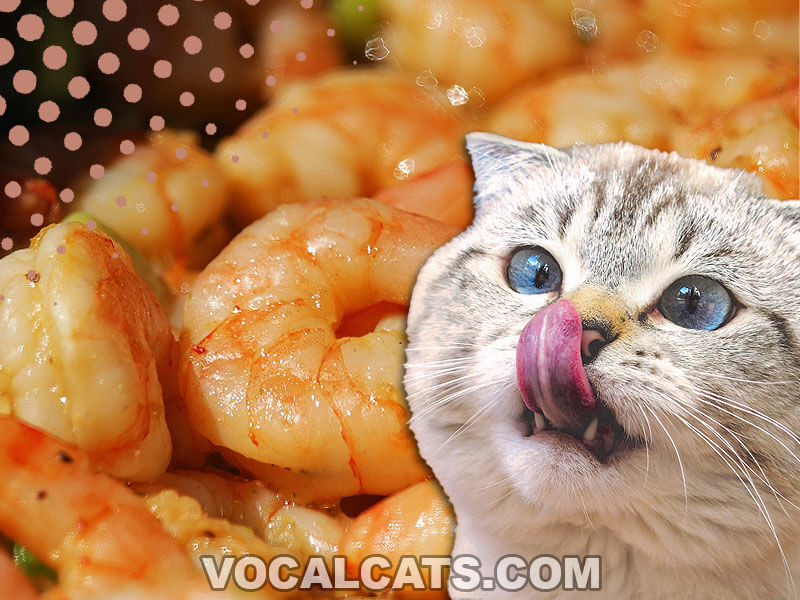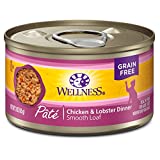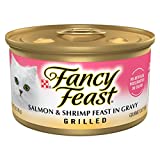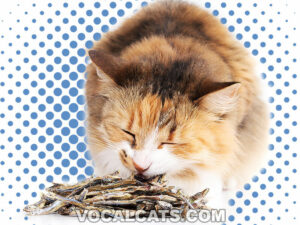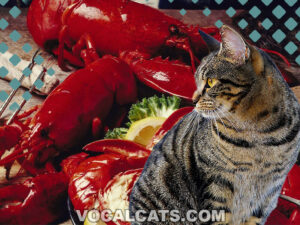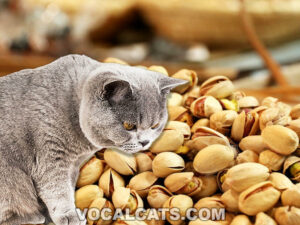Can Cats Eat Shrimp? Yes, cats can eat fresh, cooked Shrimp in moderation. A healthy portion of Shrimp provides your cat with essential nutrients like protein, antioxidants, vitamins B12 and E, zinc, and omega-3. However, it’s important to make sure the Shrimp is spice-free, unseasoned and deveined so your pet doesn’t have a negative reaction to their treat.
As a pet parent one of your most important jobs is devising a meal plan for your cat and managing their food likes and dislikes. The meals need to meet your cat’s daily dose of required nutrients.
While many felines are picky eaters, the fishy scent of sardines or Shrimp is enough to entice any cat. Pet parents will often ask, can I give my cat Shrimp? The short answer is yes, absolutely! This guide will break down everything you need to know about feeding your cat Shrimp, including the best types of Shrimp and safest cooking methods.
Contents
- Can Cats have Shrimp?
- Is Shrimp good for Cats?
- Is Shrimp bad for Cats?
- Is Shrimp safe for Cats?
- Is Shrimp ok for Cats?
- Can kittens Eat Shrimp?
- Cats and Shrimp
- Can Cats Eat Cooked Shrimp?
- How to cook Shrimp for Cats
- Are Cats allergic to Shrimp?
- How much Shrimp Can a Cat Eat?
- Cat food with Shrimp
- So, Can Cats Eat Shrimp?
- Related Questions
Can Cats have Shrimp?
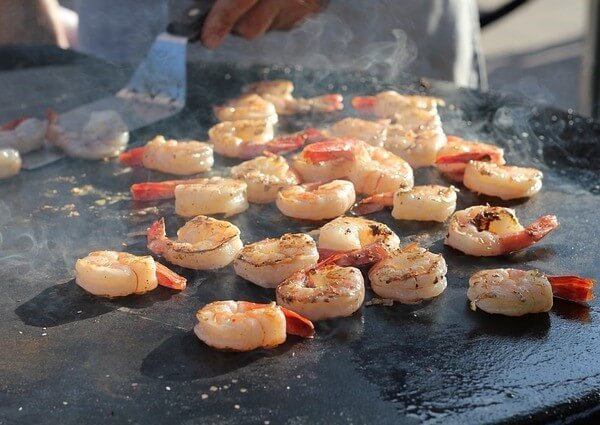
Yes, cats can have Shrimp. Cats are obligate carnivores which means they need some form of meat in their diets. Shrimp is a great source of protein in many high-quality cat foods. You may see it paired with other meat ingredients like chicken, beef, duck, or fish.
So if you’re wondering, “can my cat eat Shrimp?” The answer is yes, your adult cat can safely eat half a jumbo Shrimp at one meal time.
Shrimp offers a lot of nutritional benefits. In addition to being a great low-calorie protein, it is also a source for antioxidants, potassium, phosphorus, iron, omega-3 acids, magnesium, iodine, zinc, vitamin B12 and vitamin E.
Fortunately, there are a lot of ways to prepare Shrimp for your feline companion. You can steam, grill, saute, boil, or bake the Shrimp after properly cleaning and deveining it. But, make sure not to use any spices, oils, or seasonings when you’re making your cat’s meal.
RECOMMENDED: Can Cats Eat Lobster? Read This Before Offering a Bite
Is Shrimp good for Cats?
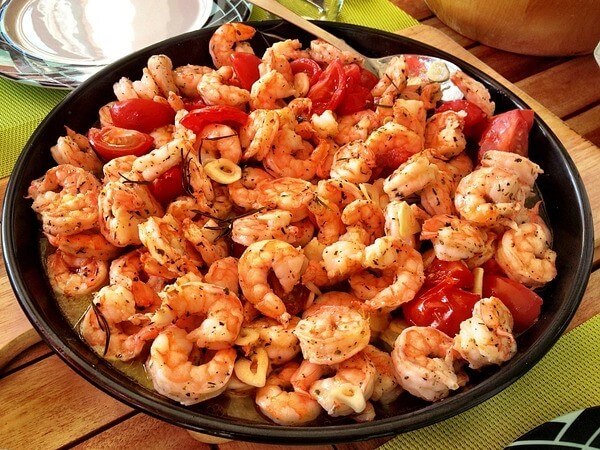
When it comes to cat food Shrimp is quite the underrated ingredient. It’s an incredibly healthy snack and can add a lot of value to your cat’s diet when prepared correctly. So, here’s why you need to start adding Shrimp to your pet’s meals.
1. Low-calorie and High-protein
If you’re raising an indoor cat you’ll definitely need to keep track of his weight gain. Indoor cats don’t often get as much exercise as outdoor cats, which can lead to obesity related health complications.
Luckily, Shrimp is a safe low-calorie protein source. According to U.S. Department of Agriculture, a 3-ounce serving of Shrimp provides 20.4 grams of protein with only 84.2 calories.
2. Six (6) Different Minerals
This same serving of Shrimp will also give your pet 6 other incredibly important minerals and nutrients, including iron, phosphorus, potassium, zinc, magnesium, and sodium. These have numerous benefits and will keep your cat’s heart, liver and kidneys in good health.
3. Antioxidants and heart health
Shrimp is rich in antioxidants. The simple way to describe antioxidants is to call them scavengers. Antioxidants scavenge or chase after unstable radical compounds known as ‘free radicals.’ Free radicals are more or less a natural phenomenon.
However, they can be predisposed to oxidative stress leading to inflammation – a major culprit in several health conditions.
The good news is Shrimp contains the antioxidant Astaxanthin.
Here is the inside story:
Shrimps love algae, which is rich in astaxanthin. This antioxidant accounts for the characteristic reddish color of Shrimps.
Fortunately, astaxanthin has more antioxidant activity than other popular antioxidants, including vitamins C and E and lutein. Thus, it can help protect your cat from free radical inflicted inflammation.
Additionally, according to a 2016 study published in Mar Drugs, astaxanthin may even improve heart health by strengthening the arteries.
4. Omega-3 fatty acids
As reported by National Institutes of Health, Omega-3 fatty acids have proven to offer numerous health benefits for humans and pets. They’re especially useful when it comes to improving heart health, and Shrimp contains high quantities of this valuable ingredient.
In addition, Omega-3s can improve your cat’s skin and nails. Therefore, feeding your feline friend a diet rich in this fatty acid will boost their overall health.
Since fatty acid is anti-inflammatory, Shrimp is a choice for cats with skin allergies and hotspots.
Furthermore, Omega-3s can boost hair follicle function so that your cat sheds less hair. Older cats suffering from joint challenges can benefit from omega-3 as it fosters joint health.
5. Iodine improves thyroid function
Shrimp is also an important source of iodine that is essential for thyroid function. Adding Shrimp to your furry friend’s diet can definitely increase your cats’ lifespan and boost their health.
RELATED: Can Cats Eat Imitation Crab? Purr-suing the Truth About Surimi!
6. Rich in essential amino acids
Yes, you read that right. Shrimp is rich in essential amino acids, especially taurine. The most important detail about amino acids is that they are the building blocks of protein.
However, your cat’s body cannot produce essential amino acids by itself. Therefore, they must be part of the diet. And cats can receive this taurine from eating a small amount of Shrimp.
So why is taurine important and why do cats need it?
Well, taurine is vital for healthy vision, digestion, fetal development, immune system function, and reproductive health.
7. Supports brain health
Shrimp contains choline, a nutrient that aids brain and cognitive function.
In its natural form, choline is a vitamin-like compound essential for cats. Cats have the innate capacity to produce choline, but their amount needs to be increased to meet physical requirements. Therefore, a choline-rich diet will suffice.
Choline also supports communication in the brain and muscles. This function is vital for learning and mental well-being in cats.
8. Shrimp provides variety in diet
Adding Shrimp to the diet is particularly beneficial for active cats, making mealtime more enjoyable.
Like humans, cats can also look forward to their meals. The variety in your cat’s diet can also break the boredom, encourage a good appetite, and keep him happy.
READ NEXT: Can Cats Eat Anchovies? (Dried, Canned, Raw & Oil)
Is Shrimp bad for Cats?
As we can see, Shrimps can be a creative addition to a cat diet, but in excess, it is not good for cats. If the Shrimp is not fresh or has seasoning and other additives, it’s best to give your kitties something else.
And while Shrimp isn’t necessarily bad for cats, it can come with certain health risks. If you’re planning on feeding your cat Shrimp, it’s your job as a pet parent to make sure you’re taking the necessary steps to prevent these harms.
Here are several reasons why Shrimp may not be the best choice for all cats:
1. Risk of Gastrointestinal and Stomach Issues
Cats, like dogs, have a sensitive gastrointestinal system linked to digestion. Therefore, when cats eat Shrimp with shells, raw Shrimp, or infected Shrimp, they may experience digestive upset.
Also, if your feline friends eat too much Shrimp, this can also result in digestive issues like vomiting, constipation, and diarrhea. This is especially true for Shrimp that has been cooking in oil or hasn’t been properly deveined.
Solution: Devein the Shrimp meat before feeding it to your cat. This means removing the shell, head and tail. Also, only serve your fuzzy friend plain-cooked Shrimp.
2. Choking
There is a risk your feline companion may choke on the Shrimp if you serve them a large, whole Shrimp that still has the tail and shell intact.
Solution: Devein and grind up the cooked Shrimp before serving it to your cat.
3. Pancreatitis
Consuming Shrimps that have been cooked with spices, seasonings, oil or butter can lead to pancreatitis in cats. You should not feed your cat Shrimp you’ve prepared for you and your family.
Solution: Only feed your cat clean, washed, unseasoned Shrimp that has been boiled or steamed.
4. Risk of bacterial infections
There is a good chance that the Shrimp you bought for your fuzzy friend is not fresh because a large amount of consumable Shrimp is imported.
While you can appreciate the availability of Shrimps in supermarkets, the question of quality remains.
Furthermore, there’s a high chance of buying farm-bred Shrimp. Farm-bred Shrimp are more susceptible to infections and diseases, and Shrimp farmers treat them with antibiotics.
Although it is unclear how antibiotics can affect cat health, the Food and Drug Administration (FDA) frowns upon them.
Additionally, while you can give your cat raw Shrimp, it’s important to note that uncooked meat has a lot of bacteria that can lead to infections. You may be putting your fuzzy companion at risk for E Coli, salmonella, or listeria.
Solution: When possible, cook the Shrimp before adding it to your cat’s meal.
5. Allergic reaction
As with humans, each cat is a unique individual with its own food preferences, tastes, and allergies. Feeding your cat Shrimp for the first time can lead to an allergic reaction in some cats.
Solution: When you’re adding a new ingredient to your cat’s diet, start with an extremely small portion size and monitor them for any negative reactions.
6. Bad eating habits
There’s a huge chance your cat will love the taste of Shrimp! In fact, they may even stop eating their regular food if they think they’ll get some yummy Shrimp treats later.
Solution: Moderate your Shrimp portion size or mix it into your pet’s regular food.
7. Iodine Contamination
It is important to establish that unless your cat has an allergy or predisposing condition, eating Shrimp will not cause iodine contamination.
However, cats are highly sensitive animals, and Shrimp with high levels of iodine can cause iodine contamination.
Furthermore, cats with hyperadrenocorticism should not consume an iodine-rich diet.
8. Mercury poisoning
The seas, lakes, oceans, and other water bodies have high mercury levels. Mercury levels in water bodies are on the rise, and adverse effects may ensue from consuming seafood.
Usually, Shrimp has less mercury concentration in comparison to other seafood animals.
However, the cat has a small body and is likely to feel the effects of even small traces of heavy metals.
A cat suffering from mercury contamination may be anxious, irritable, and physically weak. These symptoms mean that their nervous system has been affected by mercury poisoning.
The safest bet is to feed your cat fresh, cooked Shrimp in moderation.
9. High Purine Content
Seafood, particularly Shrimp, lobster, and salmon, is high in purines. Consequently, the cat’s body breaks purine into uric acid. If uric acid stays in the body for an extended period, it can cause the formation of uric acid crystals. The crystals settle in the joints and kidneys, causing gout and kidney stones.
10. Risk of Hyperlipidemia
Excessive consumption of Shrimp can predispose your cat to hyperlipidemia. High cholesterol levels can affect blood pressure.
DON’T MISS: Can Cats Eat Crab?
Is Shrimp safe for Cats?
Yes, Shrimp is safe for cats if prepared properly. That means washed, deveined, and fresh Shrimp that has been cooked without any seasonings or oils.
Safe methods to prepare Shrimp for your cat include steaming, grilling, sauteing, boiling, or baking it, after removing the shell, head, and tail.
On the other hand, processed or pre-packaged Shrimp can be toxic for cats because of its high sodium content.
Similarly, if you haven’t deveined the Shrimp or properly removing the shell, head, and tail, you may put your feline friends at risk of choking or developing stomach issues. Seasonings like butter, herbs, and spices can also be toxic for your cat.
Moreover, Shrimp can becomes unsafe for feline consumption when your kitty has a history of food allergies. Thus, it’s best to introduce the new meal gradually instead of making a sudden change.
Some cats with protein intolerance may also have difficulty-digesting Shrimp because of its high protein content.
CHECK OUT: Can Cats Eat Mackerel? (Raw, Canned, Oil, Tomato Sauce)
Is Shrimp ok for Cats?
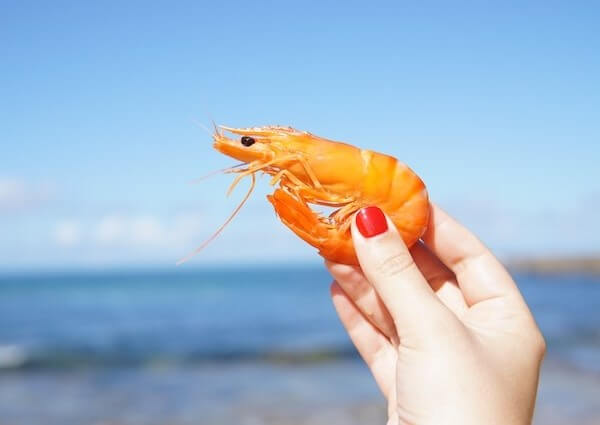
Yes, Shrimp is ok for cats to eat as long as they consume it in moderation. However, because cats are picky eaters, some may not enjoy eating Shrimp. Others may not be able to tolerate it if they have sensitive tummies.
If your cat do enjoy the taste of Shrimp, make sure to devein it and cook it properly.
Can kittens Eat Shrimp?
Kittens can eat small portions of Shrimp. While an adult cat may eat a whole Shrimp during one meal, your kitten should not eat more than ¼ or ½ of a jumbo Shrimp. What you feed a young kitten is extremely important because you’re developing his taste for food.
When you feed your kitten healthy nutritious treats like Shrimp, you’re making sure all their nutritional needs are being met. At the same time you can also introduce them to exciting new textures and flavors that older cats may have a harder time adjusting to.
Can kittens have Shrimp?
Yes, kittens can have a tiny piece of the Shrimp in addition to their regular meals. That’s because Shrimp is a good source of protein for their developing bodies.
If it’s your kitty’s first time eating Shrimp, keep an eye out for any signs of irritation, vomiting, or indigestion. Also, it’s best to keep that garnished Shrimp on your plate away from your kitty. It is advisable to feed kittens plain Shrimp meat only.
Cats and Shrimp
It’s worth mentioning that cats do not need to have Shrimp in their diet. However, it is an amazing source of protein, antioxidants, and other essential nutrients.
There’s no reason why you should restrict your fuzzy companion to a single source of meat. Often pets get bored of being fed chicken or beef all the time.
Adding some salmon, tuna, rabbit, turkey, or Shrimp to their meals can make your cat excited about meal time. But it’s important to go about it in the right way, and everything comes down to preparation.
Can Cats Eat Raw Shrimp?
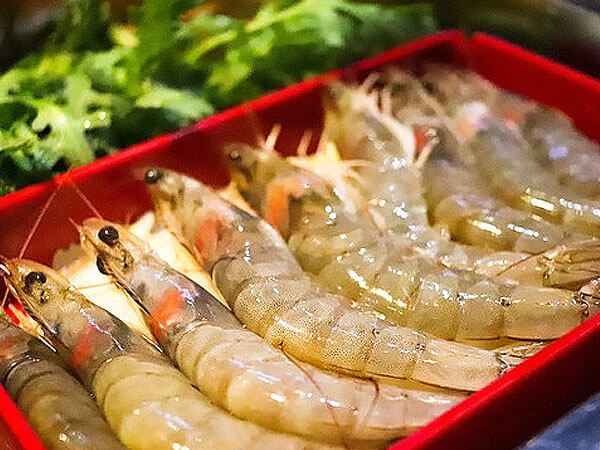
Yes, cats can eat fresh, raw Shrimp in moderation, but it is not recommended. Pet parents often ask us, “can I give my cat raw Shrimp?” The only reason we caution people against this is because uncooked seafood (like raw Shrimp) can occasionally cause bacterial infections like E.coli.
Raw Shrimps may also contain fungicides and other harmful chemicals. This is why we highly recommend that feline parents cook the Shrimp to get rid of any bacteria before feeding it to their cats.
If you do feed your cat raw Shrimp, make sure the source and quality are reliable. You should thoroughly wash the Shrimp and remove the shell, tail, and head to avoid the risk of choking.
Can Cats have Raw Shrimp?
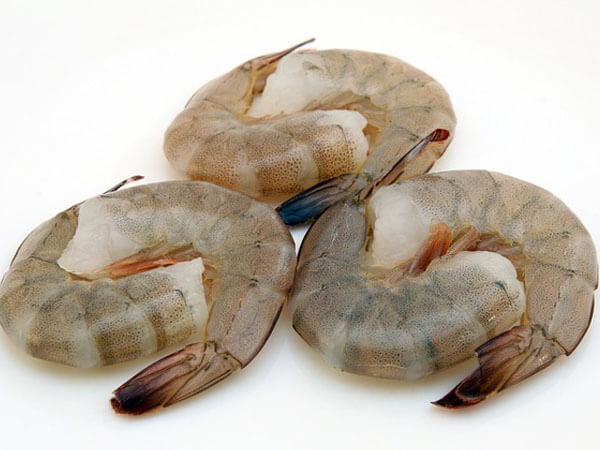
While it is safest to cook Shrimp before giving it to your kitties, your cats can have raw Shrimp in small amounts if you’re short on time. Again, be sure to devein the Shrimp and remove the head, tail, and shell to avoid choking.
Can Cats Eat Frozen Shrimp?
No, cats should not eat frozen, prepackaged Shrimp. This type of meat comes filled with preservatives like sodium that can cause sodium poisoning for your cats.
Many brands of frozen Shrimp are also seasoned with herbs and spices which are not safe for pets. Some frozen Shrimp may be coated with heavy frying batter which is harmful and unhealthy for feline consumption.
So, if you find yourself wondering, “can my cat Eat raw Shrimp?” the answer is no. Frozen Shrimp is hard and difficult to chew. Not only can it damage your feline friend’s teeth, but it can be a choking hazard.
However, if your kitty accidentally ate a frozen Shrimp, don’t fret. As long as you’re monitoring your cat closely and the frozen Shrimp is free of preservatives, brine, and seasoning, then your kitty should be fine.
Is raw Shrimp safe for Cats?
No, Raw Shrimp is not safe for cats.
Not only does raw seafood and uncooked Shrimp put your pet at risk for bacterial infections like E Coli and Salmonella, but raw shrimp may also carry traces of harmful antibiotics, fungicides, parasites, and other toxins depending on how your shrimp was sourced.
Bacteria like E. coli can cause food poisoning, digestive issues, and other cat health concerns. Therefore, it’s best not to risk it and cook the Shrimp before feeding it to your feline companions. Cooking the Shrimp helps to eliminate microorganisms, especially those that cannot survive high temperatures.
Can Cats Eat Shrimp Tails?
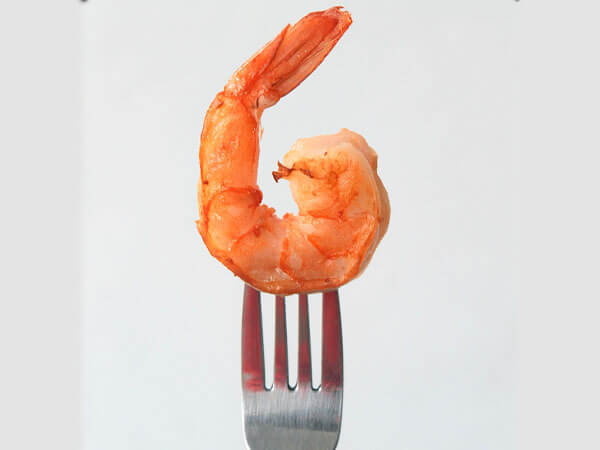
What about Shrimp tails? Can my cat Eat Shrimp tails? Absolutely not, cats should not eat Shrimp tails. You will need to remove the tails and the rest of the digestive tract of the Shrimp before you feed it to your furry companion. Shrimp tails are a choking hazard for cats.
Can Cats Eat Cooked Shrimp Tails?
No, cats should not eat cooked Shrimp tails. Shrimp tails and shells are sharp, hard, and hard to chew and digest regardless of whether they are cooked or uncooked. They can irritate the throat and cause blockages. Therefore, you should not feed your cats cooked Shrimp tails.
Can Cats have Shrimp Tails?
Overall, you cannot feed your cats Shrimp tails, either cooked or uncooked. Removing the shell, head, and tail as well as the deveining process is essential if you want to feed your cats Shrimp.
Can Cats Eat Shrimp Shells?
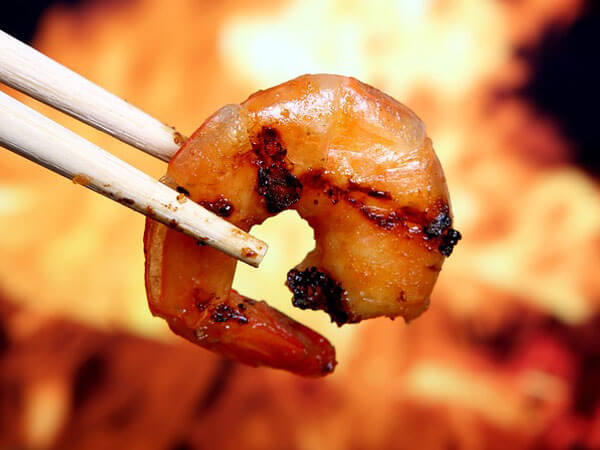
No, cats should not eat Shrimp shells. The shell itself is not toxic or harmful for your fuzzy friends, but it is very hard and can become crunchy when cooked.
As a result, your cat risks choking on this shell if he tries to swallow a large piece without properly chewing it. Additionally, if the Shrimp shells make their way to the stomach, your cat may have a difficult time digesting them and this can cause an upset stomach.
So if you’re wondering, “can I feed my cat Shrimp?,” your best bet is to remove the shell first before offering the Shrimp to your cat.
Can Cats Eat Cooked Shrimp?
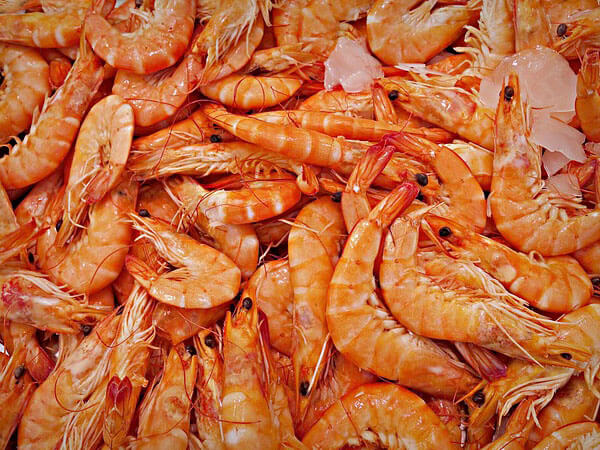
Yes, cats can eat cooked Shrimp. Now that we’ve discussed all the specifics of how to feed your cats Shrimp, the answer to can my cat Eat cooked Shrimp seems pretty obvious. Cooked Shrimp is perfectly safe for cats to eat as long as it is prepared without oil, butter, salt, or other seasonings.
Can Cats have Cooked Shrimp?
Yes, your cats can have cooked Shrimp that has been prepared especially for them. Often pet parents ask us, “can I give my cat cooked Shrimp?” But what they really mean to ask is, “Can I give my cat leftover Shrimp I prepared for myself?”
You cannot feed your cat Shrimp if it is cooked with herbs, spices, or seasoning. In fact, if you fried your Shrimp or cooked it in oil and butter, it is no longer suitable for your feline friends.
As with any new food, starting with a small amount before making a major transition is important. Also, it would be best to watch how your cat reacts to cooked Shrimp before making it a part of their diet.
Is cooked Shrimp good for Cats?
Shrimp that has been cooked properly is extremely good for your cat’s health because of the health benefits it provides. It all comes down to the method of preparation you used.
Most adult cats can chew Shrimp on their own, but if you cook it, you can chop it into pieces afterward.
How to cook Shrimp for Cats
Cooking Shrimp for your cats is really easy and requires very little effort. In fact, you won’t even need any additional ingredients, just a little bit of prep time. Here’s what you need to do.
Step 1: Buy fresh Shrimp that is not processed or pre-packaged. If you’re buying frozen Shrimp make sure it has no preservatives.
Step 2: Properly wash the meat until it is clean.
Step 3: Remove the head, tail, and shell and devein the Shrimp.
Step 4: Cook the Shrimp by streaming, grilling, sauteing, boiling, or baking it.
At no point should you add any extra ingredients or steps to the cooking process. That means no herbs or spices, and especially no oil or butter.
Once you’re done, you can pull the cooked Shrimp apart or grind it up for your cats.
Can Cats Eat Fried Shrimp?
No cats cannot eat fried Shrimp since oil, butter, and any heavy breaded batter are bad for their health.
Can Cats Eat Boiled Shrimp?
Yes, cats can eat boiled Shrimp as it is amazing for their health. It provides a number of nutritional benefits and is the easiest for their tiny bodies to digest.
Can Cats Eat Cocktail Shrimp?
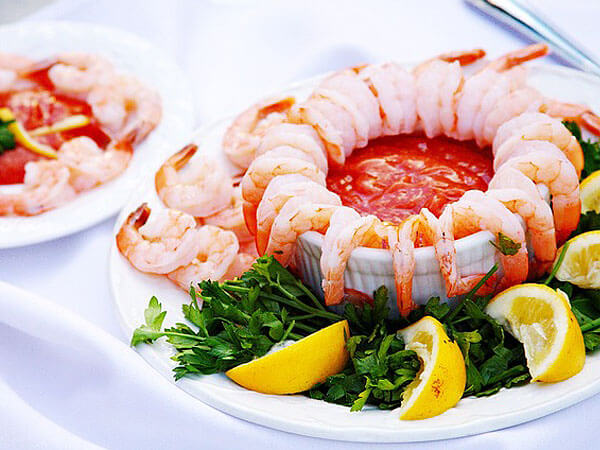
No, cats cannot eat cocktail Shrimp since they are served in a sauce that may be toxic for cats. Most cocktail shrimp sauce contain lemon, Worcestershire sauce, and horseradish. Some even contains hot sauce. These are harmful for feline consumption.
Can Cats Eat Dried Shrimp?
Absolutely, dried Shrimp is an amazing high-protein low-calorie treat your cats are sure to love. You can prepare these yourself or purchase freeze dried Shrimp treats from a reputable brand.
Can Cats Eat Popcorn Shrimp?
No, cats cannot eat popcorn Shrimp. This appetizer is made by frying Shrimp that is breaded and seasoned with onion and garlic, which is harmful to cats.
Can Cats Eat Canned Shrimp?
No, cats cannot eat canned Shrimp which often comes with preservatives, sodium, and many other ingredients that are toxic for pets. In fact, the Shrimp itself is cooked in a mixture of sugar and spice before processing, making it harmful for your cats.
Can Cats Eat Seasoned Shrimp?
No, cats should not eat seasoned Shrimp as it can be unhealthy or even toxic for your pets.
Can Cats Eat Shrimp chips?
No, cats cannot eat Shrimp chips since they are traditionally mixed with a number of ingredients that may be harmful for cats. These include flour, onion, garlic, spices, and seasonings.
Also, Shrimp chips are high in fat and preservatives, making them the worse treat option for cats.
Can Cats Eat whole Shrimp?
No, it is not safe for cats to eat whole Shrimp. You should devein the Shrimp and remove the shell, tail, and head before feeding it to your cat.
Can Cats Eat Breaded Shrimp?
No, cats cannot eat breaded Shrimp since it contains seasoning and heavy breaded batter that are unhealthy for cats. Most breaded Shrimps contain flour, cornmeal, and breadcrumbs that are hard for cats to digest.
Can Cats Eat Brine Shrimp?
No, cats should not eat brine Shrimp. This type of Shrimp is packaged in salt water and can cause sodium poisoning in cats. The high quantities of sodium can lead to an electrolyte imbalance be toxic for your fuzzy pets.
But if you’re referring to brine Shrimp as the tiny, saltwater crustaceans, then yes, cats can enjoy a small amount of brine Shrimp. This type of brine Shrimp is typically freeze-dried. However, you’ll want to cook it properly before feeding brine shrimp to your cat.
Can Cats Eat Coconut Shrimp?
No, cats cannot eat coconut Shrimp since it is seasoned with spices, coated with dried coconut flakes and breadcrumbs, and then deep fried. Not only is the coating difficult for cats to swallow, but it is also high in fat and spices.
Can Cats Eat Shrimp heads?
No, cats should not eat Shrimp heads as they are difficult for cats to digest. Veterinarians suggest that it is best to remove the Shrimp heads before offering the Shrimp meat to your cats.
Do Cats like Shrimp?
Yes, some cats do love the taste of Shrimp. In fact, you’ll be hard pressed to find a cat doesn’t like Shrimp. While most felines are a fan of seafood, some older cats may be hesitant to try a new food they’ve never experienced before.
Are Cats allergic to Shrimp?
Yes, it is possible for your cat to be allergic to Shrimp. If this is your first time feeding your cat Shrimp, be on the lookout for vomiting, diarrhea, constipation, or other intestinal issues. Other symptoms may include inflammation in the paws, skin rashes, fur loss, blisters or lesions, diarrhea, skin infections, vomiting, and swelling.
Can Cats be allergic to Shrimp?
Yes, it is possible for your cats to be allergic to Shrimp. As a preventative measure, always introduce new foods into your pet’s diet slowly and gradually.
Feed your feline friend a small portion of Shrimp and stay on the lookout for any negative reactions or symptoms. If you notice a change in behavior, digestive or skin issues, you should take him or her to the vet immediately. The vet will perform a physical examination, blood, and skin test.
How much Shrimp Can a Cat Eat?
An adult cat can eat ¾ to 1 Shrimp during one meal. Younger cats or kittens should stick to ½ a Shrimp. As a rule of thumb, it is better as an occasional treat.
How to properly feed your Cat Shrimp?
The proper way to feed your cat Shrimp is to first remove the head, tail, and shell and devein it. Then you’ll want to cook it.
Cat food with Shrimp
One way to add Shrimp to your cat’s diet is by finding a cat food brand that uses Shrimp as one of its top ingredients. Here are two we highly recommend:
Purina Pro Plan Pate Cat Food Salmon, Shrimp & Rice Entree
This Purina gravy special is a cat favorite. It comes with Salmon, Shrimp and Rice as the top ingredients and is chock full of healthy antioxidants, vitamins, and omega-6 fatty acids that will keep your feline friends in great shape!
Not only does Purina Pro Plan’s recipe cater to your cat’s taste buds, but it also boasts an array of health benefits. The high-quality protein sources help support your cat’s lean muscle mass, while the carefully crafted formula provides complete and balanced nutrition for your adult cat.
Why settle for ordinary cat food when you can elevate your cat’s mealtime experience with the rich, savory flavors of Purina Pro Plan Salmon and Shrimp Entrée?
This gourmet wet cat food is formulated by experts focusing on taste, texture, and nutritional value. Plus, it’s fortified with essential vitamins and minerals to support your cat’s overall health and well-being.
When you choose Purina Pro Plan, you’re not only spoiling your cat with a delicious meal but also investing in their long-term health.
Don’t let your cat miss out on this delicious dining experience. Click the link and order Purina Pro Plan Salmon and Shrimp Entrée in Sauce now, and let your cat indulge in the flavors they deserve!
Fancy Feast Grilled Wet Cat Food Salmon and Shrimp Feast in Gravy
The Fancy Feast Grilled food comes in a delicious Salmon and Shrimp flavor that flies off the shelves. Pet parents swear by this brand that uses high-quality ingredients to deliver a high-quality product.
This sumptuous meal provides a savory blend of high-quality grilled salmon simmered in a delicious gravy that will have your cat purring with satisfaction.
Purina Fancy Feast not only offers a delectable taste experience but also ensures complete and balanced nutrition for adult cats. Its expertly formulated recipe is rich in essential vitamins and minerals, promoting your cat’s overall health and well-being.
Give your cat the royal treatment they deserve with this mouthwatering meal, crafted to satisfy even the most discerning feline palates. Why settle for anything less than the best when it comes to your cat’s dining experience?
Choose Purina Fancy Feast Grilled Salmon in Gravy and let your beloved feline friend relish the gourmet flavors they crave. Order now and see your cat’s mealtime transformed into an irresistible feast!
So, Can Cats Eat Shrimp?
Absolutely! Cats can eat fresh Shrimp that has been cooked without seasonings or oil. There are a lot of ways to prepare Shrimp for your cat. You can steam, grill, sauté, boil, or bake the Shrimp after properly cleaning and deveining it.
On the other hand, you cannot feed your cat fried Shrimp, brined Shrimp, or canned Shrimp that has additives in it. While you can use frozen Shrimp, your cat may find it hard to chew or swallow making it a choking hazard.
A normal portion size for an adult cat is ½ to 1 jumbo shrimp per meal time, while kittens can be fed ¼ to ½ shrimp in a day.
However, you should consider your pet’s dietary requirements and your vet’s advice before offering it to them.
Related Questions
Shrimp is incredibly popular with both cats and dogs. They can eat well-cooked and plain Shrimp. It’s extremely nutritious and will offer your pet a wide range of health benefits! However, you should consider your pet’s dietary requirements and your vet’s advice before offer it to them.
DISCLAIMER: THIS WEBSITE DOES NOT PROVIDE MEDICAL ADVICE
The information, including but not limited to, text, graphics, images and other material contained on this website are for informational purposes only. No material on this site is intended to be a substitute for professional veterinary advice, diagnosis, or treatment. Always seek the advice of your veterinarian or other qualified health care provider with any questions you may have regarding dietary needs.
Resources:
https://www.ncbi.nlm.nih.gov/pmc/articles/PMC6145226/
https://www.ncbi.nlm.nih.gov/pmc/articles/PMC8495020/
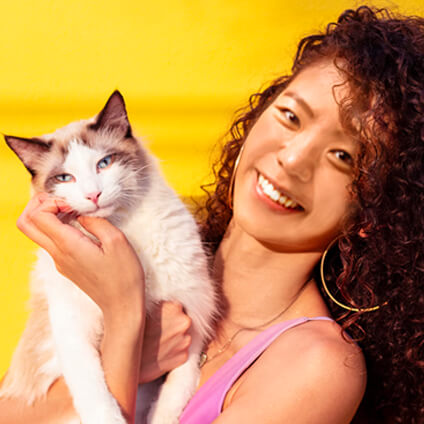
With over five years of specialized experience as an animal writer, my expertise lies in cat nutrition, health, behavior, grooming, and training. I am dedicated to delivering helpful and informative content that caters to the well-being of our feline friends. My primary goal is to empower pet owners with knowledge and ensure our feline companions thrive in health and happiness. In my free time, I love volunteering at local cat rescue centers.
